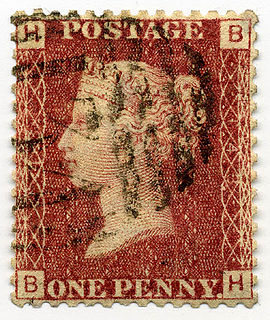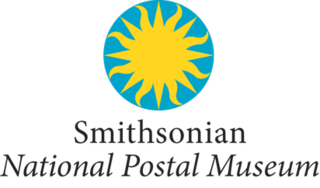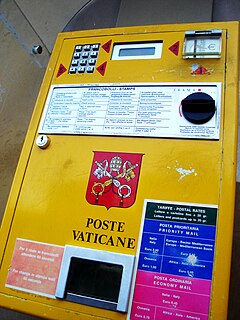National Philatelic Museum may refer to
National Philatelic Museum may refer to

Philately is the study of postage stamps and postal history. It also refers to the collection, appreciation and research activities on stamps and other philatelic products. Philately involves more than just stamp collecting or the study of postage; it is possible to be a philatelist without owning any stamps. For instance, the stamps being studied may be very rare or reside only in museums.

Stamp collecting is the collecting of postage stamps and related objects. It is an area of philately, which is the study of stamps. It has been one of the world's most popular hobbies since the late nineteenth century with the rapid growth of the postal service, as a never-ending stream of new stamps was produced by countries that sought to advertise their distinctiveness through their stamps.

Postal history is the study of postal systems and how they operate and, or, the study of the use of postage stamps and covers and associated postal artifacts illustrating historical episodes in the development of postal systems. The term is attributed to Robson Lowe, a professional philatelist, stamp dealer and stamp auctioneer, who made the first organised study of the subject in the 1930s and described philatelists as "students of science", but postal historians as "students of humanity". More precisely, philatelists describe postal history as the study of rates, routes, markings, and means.

In philately, the term cover pertains to the outside of an envelope or package with an address, typically with postage stamps that have been cancelled and is a term generally used among stamp and postal history collectors. The term does not include the contents of the letter or package, although they may add interest to the item if still present. Cover collecting plays an important role in postal history as many covers bear stamps, postmarks and other markings along with names and addresses all of which help to place a cover at a given time and place in history.

The Royal Philatelic Collection is the postage stamp collection of the British royal family. It is the most comprehensive collection of items related to the philately of the United Kingdom and the British Commonwealth, with many unique pieces. Of major items, only the British Guiana 1c magenta is missing from the collection of British Imperial stamps.
India Post is a government-operated postal system in India, part of the Department of Post under the Ministry of Communications. Generally known as the Post Office, it is the most widely distributed postal system in the world. Warren Hastings had taken initiative under East India Company to start the Postal Service in the country in 1766. It was initially established under the name "Company Mail". It was later modified into a service under the Crown in 1854 by Lord Dalhousie. Dalhousie introduced uniform postage rates and helped to pass the India Post Office Act 1854 which significantly improved upon 1837 Post Office act which had introduced regular post offices in India. It created the position Director General of Post for the whole country.

The National Postal Museum, located opposite Union Station in Washington, D.C., United States, covers large portions of the Postal history of the United States and other countries. It was established through joint agreement between the United States Postal Service and the Smithsonian Institution and opened in 1993.

The Singapore Philatelic Museum is a museum about the postal history of Singapore and its stamps.

The Royal Philatelic Society London (RPSL) is the oldest philatelic society in the world. It was founded on 10 April 1869 as The Philatelic Society, London. The society runs a postal museum, the Spear Museum of Philatelic History, at its headquarters in the City of London.

The National Heritage Board (NHB) is a statutory board under the Ministry of Culture, Community and Youth (MCCY) of the Government of Singapore. It was formed on 1 August 1993.

The Philatelic and Numismatic Office of the Vatican City State is responsible for issuing Vatican postal stamps and Vatican coins.

The postage stamps and postal history of Israel is a survey of the postage stamps issued by the state of Israel, and its postal history, since independence was proclaimed on May 14, 1948. The first postage stamps were issued two days later on May 16, 1948. Pre-1948 postal history is discussed in postage stamps and postal history of Palestine.

A postal museum is a museum dedicated to the display of objects relating to the postal service. A subcategory of postal museums are philatelic museums, which focus on philately and postage stamps.
The Smithsonian Philatelic Achievement Awards is a biennial honor presented by the United States National Postal Museum. The award is designed to recognize individuals for
"...outstanding lifetime accomplishments in the field of philately. The achievements can include original research that significantly advances our understanding of philately and postal history; exceptional service to the philatelic community, and, the overall promotion of philately for the benefit of current and future collectors."

The Spellman Museum of Stamps & Postal History, also commonly known as the Cardinal Spellman Philatelic Museum, is a not-for-profit organization dedicated to the appreciation of diversity through the medium of postage stamps and postal history.
David Richard Beech MBE was the curator of the British Library Philatelic Collections from 1983–2013. He is a fellow and past-president of the Royal Philatelic Society London (RPSL). In 2013, it was announced that Beech was to receive the Smithsonian Philatelic Achievement Award for outstanding lifetime accomplishments in the field of philately.

The British Library Philatelic Collections is the national philatelic collection of the United Kingdom with over 8 million items from around the world. It was established in 1891 as part of the British Museum Library, later to become the British Library, with the collection of Thomas Tapling. In addition to bequests and continuing donations, the library received consistent deposits by the Crown Agency and has become a primary research collection for British Empire and international history. The collections contain a wide range of artefacts in addition to postage stamps, from newspaper stamps to a press used to print the first British postage stamps.
The Universal Postal Union Collection is a deposit by the General Post Office (GPO) in the United Kingdom, under section 4 of the Public Records Act, of its duplicate Universal Postal Union collection of 93,448 stamps, covering the period from 1908.

The Crawford Library is a library of early books about philately formed between 1898 and 1913 by James Lindsay, 26th Earl of Crawford. By the time of his death in 1913, Crawford was thought to have amassed the greatest philatelic library of his time. Today, the library is part of the British Library Philatelic Collections.